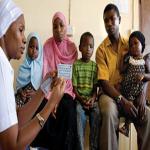03 December 2009
Putting the brakes on worldwide population growth could help curb dangerous greenhouse gas emissions, says a new United Nations report called, The State of the World Population 2009. The report says an effective way to achieve both goals is to empower women with education and reproductive rights.
Poor women farmers bear the brunt of climate change
Lead author Robert Engelman says this is the first study in which a U.N. agency connects climate change to the status of women. He notes that women manage households, are more likely to be poor and live in areas vulnerable to floods, rising seas and storms.
That makes it harder for them get food, water or energy for their families. Engelman says the unequal burden they shoulder from climate change has been largely ignored. This hasn't gone unnoticed by women's groups or indeed by the authors of this report, who will be in Copenhagen at this month's U.N. climate summit.
Women can be a powerful force if included in talks
Engelman says any new global warming deal that comes from the meeting must address the special impact of climate change on women, as a matter of equality and human rights. "If they can be at tables, negotiating tables, village councils, whatever, these perspectives can really inform their work on climate change."
The U.N. report describes how women can be a powerful force in climate-change mitigation. "They produce most of the food in Africa," and Engelman notes, "their own efforts to improve their farm soil and grow the most resilient crops can literally suck carbon out of the air and put it into soil and in the roots of plants.
The report finds that where women's groups are most active, there tends to be less deforestation. Engelman adds, however, that in their role as environmental stewards, women sometimes face major obstacles imposed by their low status relative to men.
Education and family planning can play a role

Sala Lewis/UNFPA
A family receives family planning advice at Kivunge Hospital, ZanzibarWorldwide, 200 million women lack access to family planning services they want or need, says Engelman, who is also vice president for programs at the Worldwatch Institute.
Decades of family planning research, he says, make it clear that girls empowered with education and access to family planning services, have smaller families when they become adults. Family planning is not a quick fix to climate change, Engelman says. But he believes educating women and giving them access to health care and reproductive choice are steps in the right direction.
For government leaders, policy makers and climate negotiators meeting in Copenhagen, he says the central message of the U.N. population report boils down to this: "Women – their lives, their status and their human development – matter to climate change, now and in the future."